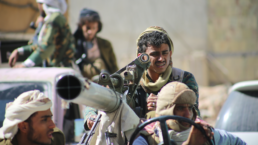If the U.S. had supported pro-democracy forces in 2011, the current situation might be very different.
by Stephen Zunes, The Progressive
There are a number of issues of concern regarding the U.S.-led bombing campaign against Houthi targets in Yemen, one of the poorest countries in the world. Like other military operations ordered by the President without Congressional authorization, it raises serious constitutional questions. The strikes have thus far not had the intended effect of curbing Houthi attacks on international shipping. They have undermined the UN-led peace process to finally end that country’s nine-year civil war. Not surprisingly, there is a degree of incredulity in the Biden Administration’s claim that “We will continue to work to avoid a wider conflict in the region” while bombing Yemen, Syria, and Iraq.
Moreover, the United States may have played a significant role in bringing the Houthis—once a small rebel group representing a minority tribe in the north of Yemen—to control nearly three-quarters of the western part of that country, where the vast majority of its thirty-three million people live.

Middle Eastern governments may condemn Israel’s war on Gaza and criticize the United States for supporting it, but none of them dare to take on Israel or the United States directly. Irregular groups, however—as well as Hezbollah in Lebanon, the Houthis, and various militias operating in Syria and Iraq—have more freedom of action. In doing so, they increase their power and influence among the region’s peoples angered by the ongoing mass killing of Palestinian civilians and their governments’ inability or unwillingness to act.
Becoming the victims of bombing by the United States and its allies has actually strengthened the Houthis politically. Despite widespread opposition to the Houthis, millions of Yemenis have taken to the streets in protest of the bombing.
Recent Posts
‘Unconstitutional. Unethical. Authoritarian.’ ICE Bars Millions Of Immigrants From Bond Hearings
July 18, 2025
Take Action Now One watchdog said the new policy “seems like a blatant attempt to stop them from exercising their right to due process.”……
Americans Are Not Nearly Alarmed Enough About Climate Change
July 18, 2025
Take Action Now Americans still don’t comprehend how imminent, dangerous, and far-reaching the threat is—and journalists are partly to blame.By…
The IRS Is Building A Vast System To Share Millions Of Taxpayers’ Data With ICE
July 17, 2025
Take Action Now ProPublica has obtained the blueprint for the Trump administration’s unprecedented plan to turn over IRS records to Homeland Security…
Israel’s Sudden Assault On Syria Is Unchecked Aggression
July 17, 2025
Take Action Now Jerusalem is bombing Damascus and threatening al-Sharaa’s rule, while Washington was hoping to help the nascent government on…




